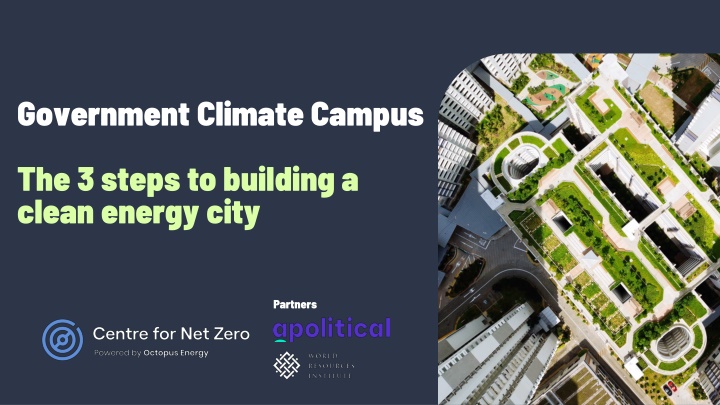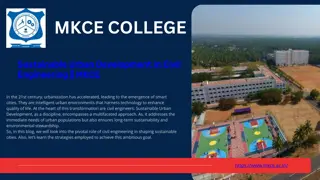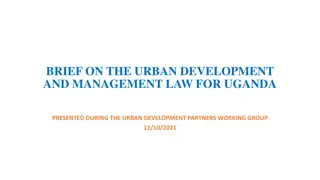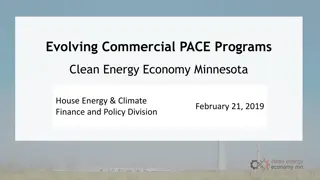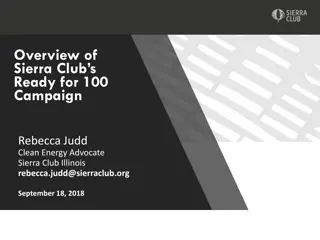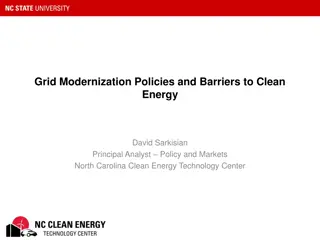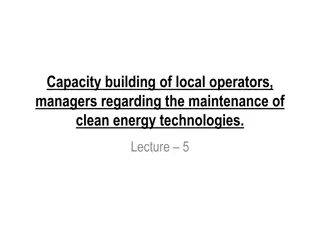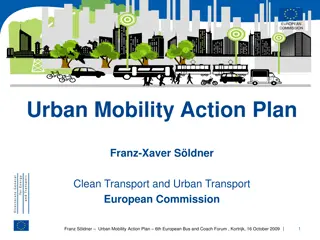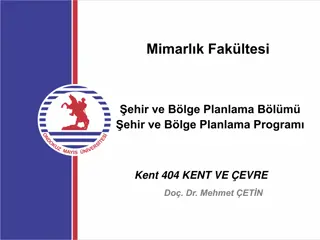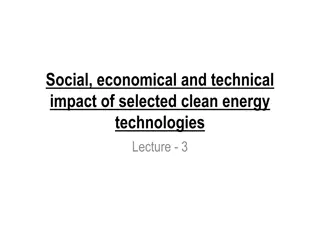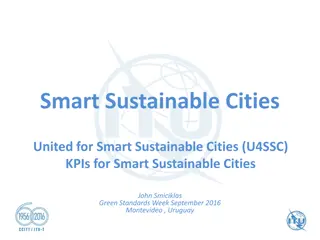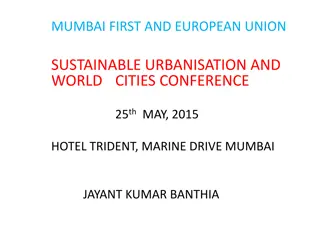Sustainable Urban Development Strategies for Clean Energy Cities
Discover the journey towards building clean energy cities by following the three steps of pioneering research, adoption of low-carbon technologies, and the introduction of new business models. Learn from data collected from 17 cities worldwide and explore city typologies and recommendations for urban flexibility, decarbonisation, and consumer engagement to create a sustainable global energy system.
Download Presentation

Please find below an Image/Link to download the presentation.
The content on the website is provided AS IS for your information and personal use only. It may not be sold, licensed, or shared on other websites without obtaining consent from the author.If you encounter any issues during the download, it is possible that the publisher has removed the file from their server.
You are allowed to download the files provided on this website for personal or commercial use, subject to the condition that they are used lawfully. All files are the property of their respective owners.
The content on the website is provided AS IS for your information and personal use only. It may not be sold, licensed, or shared on other websites without obtaining consent from the author.
E N D
Presentation Transcript
Government Climate Campus The 3 steps to building a clean energy city Partners
PIONEERING RESEARCH TO MAKE A FULLY SUSTAINABLE GLOBAL ENERGY SYSTEM A REALITY.
ADOPTION CURVE OF LOW CARBON TECHNOLOGIES
NEW BUSINESS MODELS FOR BUILDINGS 1) GENERATE 2) USE 3) STORE DEMAND MANAGEMENT INCENTIVES
INTRODUCING CLEAN ENERGY CITIES
Data from 17 cities around the world Stockholm Manchester London Amsterdam Vancouver Paris Nantes Tokyo Los Angeles Valencia Bengaluru Medellin Singapore Nairobi Johannesburg Sydney Buenos Aires
CITY TYPOLOGIES HEADLINES CONNECTED FREE MARKET High market reform High digital- isation High population High mix of uses Paris, London, Tokyo Singapore, Bengaluru, LA SCALABLE DISTRIBUTED AVAILABLE High data High EV ownership Demographics availability High regional renewables High High heat/ cooling demand Decarbonisation High land available renewable potential Urban flexibility Consumer flexibility Buenos Aires, Johannesburg, Nairobi Stockholm, Vancouver, Medellin, Amsterdam Nantes, Valencia, Manchester, Sydney
2025 RECOMMENDATIONS Urban Flexibility Decarbonisation Consumer Flexibility Source of Flexibility Data platforms Planning policies and standards LCT community assets Investment Retail market reform Consumer engagement Typology Connected EVs with residential parking permits access to non- domestic chargepoints Data platforms for strategic infrastructure planning VRE modules and batteries as community assets Economic development to fund programmes for energy innovators Cities set up an information hub for consumer flexibility Free market EVs and chargepoints for public sector fleet and properties District data platforms in areas of current high grid congestion Smaller VRE modules as community assets Use powers for economic development to fund energy innovators Grid stress management alert system Scalable Procure EVs and chargepoints for public sector fleet Growth area data platforms LCT policies for major public sector projects Medium-sized VRE modules and batteries as community assets Purchasing of storage in areas of grid congestion Policies for public sector time of use tariffs Resident community energy boards Distributed Local generation and storage for new build developments Support programmes for the rooftop solar supply chain Move public buildings supplied by renewable energy onto dynamic tariffs Support smart heating/cooling and charging in domestic sector supplied by excess local renewable generation Available Set a goal for storage capacity per resident Larger-sized VRE modules and batteries as community assets Support financing of storage for private owners All public sector properties on dynamic tariffs Support rollout of domestic smart heating/cooling and charging paired with nearby storage
2040 RECOMMENDATIONS Urban Flexibility Decarbonisation Consumer Flexibility Source of Flexibility Data platforms Planning policies and standards LCT community assets Investment Retail market reform Consumer engagement Typology Designate EV/smart charging district Include smart meter data in city datastore Include rooftop solar in every non-domestic planning agreement Require LCTs part of retrofit of entire social housing estate Pension funds directly invest in future energy systems Make all public sector chargepoints only open to EVs on intelligent tariffs Create tax rebates for EVs that are flexible in the right locations in the city Connected Coordinated EV charging hours Procure EVs and chargepoints across public sector fleet Designate a special data zone for innovation in energy technologies Require all public buildings to have LCTs on site Designate solar districts in areas of grid congestion Create local tax rebates for investments in renewable generation and storage Create tax rebates for access to private chargepoints for those on intelligent roaming tariffs Create tax rebates for automating smart charging, heating and/or cooling Free market Develop community retrofit programmes Designate EV-only parking at public buildings Build growth zone datastores Require LCTs for all new builds, public and private Procure VRE modules and batteries for all public buildings Invest in and create products of renewable generation and storage assets Move all public sector properties onto a time of use tariff Support programmes for investment in community energy Scalable Develop community retrofit programmes Create tax rebates for access to smart chargepoints Designate a EV-only inner urban core Build data platforms for strategic planning of generation and storage Require local generation in masterplans Procure LCTs at every MV substation Designate rooftop solar investment areas Require all public sector properties have local generation and public chargepoints Implement a joint venture for energy sharing for economically disadvantaged neighbourhoods Distributed Install strategic large- scale storage for every MV substation Build data platforms for strategic planning of storage Require local storage in masterplans Procure on-premises batteries for all public sector buildings Designate storage investment areas Tax rebates for local generation and storage on a dynamic tariff Create tax rebates for joining an intelligent tariff plan Available Sell green bonds to the markets EV chargepoints on intelligent tariffs Tax rebates for businesses that invest in storage that charge from renewables
CLEAN ENERGY CITIES IN THE REAL WORLD
INSPIRATIONS: LONDON ZERO BILLS HOMES Remote-managed self-use, import, and export Support smart heating/cooling and charging in domestic sector supplied by excess local renewable generation Distributed City - 2025 Prefer smaller VRE modules and batteries as community assets Connected City - 2025 Set up an information hub for consumer flexibility
INSPIRATION: THE SMART BUILDING RATING Value on flexibility for better incentives The Smart Building Rating will support demand for smart devices in a growing market, adding a key missing part: a measure which can be linked to green finance and property value. This bolsters the reinforcing feedback loops that can see these smart devices scale. It also increases consumer awareness of demand flexibility, as well as visibility of flexibility capacity in the system.
INSPIRATION: CALIFORNIA FLEX ALERT Automated responses to high demand Grid stress management alert system Free market City - 2025 Create local tax rebates for investments in renewable generation and storage Free market City - 2040 A Flex Alert is issued in the summer when extremely hot weather drives up electricity use, making the available power supply scarce. This usually happens in the evening hours when solar generation is decreasing and consumers are returning home and switching on air conditioners, lights, and appliances. The California Public Utilities Commission created a new incentive, the Emergency Load Reduction program, that compensates consumers who reduce their electricity use when a Flex Alert is in effect.
INSPIRATION: SEATTLE WASTE REMOVAL EV FLEET EVs taking over the public sector Procure EVs and charge- points for public sector fleet Scalable City - 2025 Require LCTs for all new builds, public and private Scalable City - 2025 Develop community retrofit programmes. When the 10-year contract for waste haulers came up for renewal in 2018, Seattle s waste and water utility Seattle Public Utilities saw an opportunity to implement a major change in waste hauling services. Seattle s new waste fleet includes 200 new clean emissions vehicles powered by electricity, renewable natural gas, and renewable diesel. This includes two full size 100% electricity recycling trucks.
LIVE PROJECTS: BIRMINGHAM -TYSELEY Modelling local storage investment Build data platforms for strategic planning of storage Available city - 2040 FEEDER HEADROOM IN 2030 = FLEX AND STORAGE NEEDS
Financing Tech adoption and flexibility Consumer engagement
